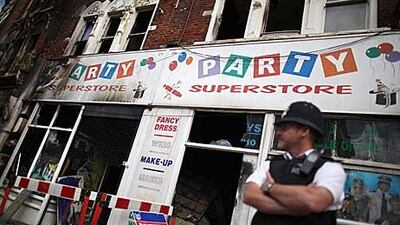LONDON // The ringleaders of what have been called the BlackBerry riots were being hunted yesterday by the UK intelligence services' electronic eavesdroppers.
Experts at Government Communications Headquarters (GCHQ), whose usual work is intercepting messages between Al Qaeda terrorists and monitoring other security threats, have been diverted to the disorder on Britain's streets because rioters are using social networking sites and, particularly, BlackBerry Messenger (BBM) messages to organise looting.
Police have evidence that street gangs, anarchists and even organised crime syndicates have been using smartphone technology to coordinate looting and robbery.
David Lammy, MP for Tottenham in north London, where a fatal shooting by police last week was the catalyst for the crime wave, has even appealed for BBM services to be suspended in the capital.
Canadian firm Research in Motion (RIM), maker of the BlackBerry, is now "engaged with the authorities to assist in any way we can".
In response, a group or person identified only as Team Poison hacked RIM's blog and posted a message warning: "If you do assist the police by giving them chat logs, GPS locations, customer information and access to people's BlackBerry Messengers, you will regret it."
BBM messages are virtually untraceable and encrypted, which has led Scotland Yard to call on the expertise of the intelligence gatherers at GCHQ.
Mike Butcher, digital adviser to London Mayor Boris Johnson, has called BBM as "an encrypted, very secure, safe, fast, free, easy way for disaffected urban youth to spread messages for the next targets".
A widely circulated message in the wake of initial rioting in Tottenham on Saturday read: "Everyone in Edmonton, Enfield, Wood Green, everywhere in north, link up at Enfield Town Station at 4 o'clock sharp!!!"
The result was looting, arson and violence in all those areas. Rodney Barker, emeritus professor of government at the London School of Economics, said the use of modern communications had changed the nature of rioting, with those involved in the current troubles numbering in their hundreds rather than thousands.
"Some people clearly are being opportunistic but the numbers are really quite small and it appears there is a lot of communication between various of the groups," Prof Barker said yesterday. "You have groups who are highly technically integrated but, socially, completely outclassed and alienated."
BBM messages have not been the only communication tool used.
More than six people - the youngest 17, the oldest 22 - appeared in courts in England and Scotland yesterday accused of using Facebook to try to organise disturbances.
Police in Birmingham were ready for the trouble that broke out on Monday after being forewarned that Facebook, BBM and Twitter were urging youths to gather.
Twitter was also used to encourage violence in Tottenham. One of many Tweets urged: "Everyone up and roll to Tottenham [to] f*** the 5-0 [police]. I hope I dead tonight."
The Independent newspaper had the embarrassment of having to fire Jody McIntyre, one of its bloggers, after he instructed his 9,000 followers on Twitter: "Be inspired by the scenes in Tottenham and rise up in your neighbourhood.
100 people in every area - the way we can beat the feds." Stephen Kavanagh, second in command of London's police, has vowed to track down those using BBM and social networking to cause trouble.
The phones of arrested looters could offer prosecutors vital supporting evidence in court if they are found to contain messages referring to the organisation of riots. But some experts believe too much emphasis is being placed on the role of BBM and social media at the expense of searching for the underlying causes of the trouble.
Ian Maude, of Enders Analysis, a London telecommunications research company, told the Wall Street Journal: "They're not good or evil in themselves. It's the purposes for which people use them.
"At the moment they are being used by some looters, rioters and vandals to communicate. "But you could argue that should help law enforcement agencies keep track of what's going on."
dsapsted@thenational.ae
* Additional reporting by Agence France-Presse

